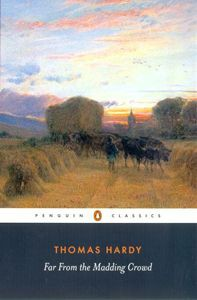Like many people I had to read Hardy at school – Tess of the D’Urbervilles and The Mayor of Casterbridge and I decided there would be no more Hardy after that. However, my book study group are having a Hardy year, so I have been forced to read some more and I have to say I am pleasantly surprised. So far I have read Under the Greenwood Tree and Far from the Madding Crowd. Under the Greenwood Tree was charming and delightful (and dare I say fun). Far from the Madding Crowd is darker, but still not the miserable affair I associate with Hardy.
Here is how Penguin describe Far from the Madding Crowd
Independent and spirited Bathsheba Everdene has come to Weatherbury to take up her position as a farmer on the largest estate in the area. Her confident presence draws three very different suitors: the gentleman-farmer Boldwood, soldier-seducer Sergeant Troy and the devoted Shepard Gabriel Oak. Each, in contrasting ways, unsettles her decisions and complicates her life, and when tragedy ensues, the stability of the whole community is threatened. The first of his works set in Wessex, Thomas Hardy’s novel of swift passion and slow courtship is imbued with his evocative descriptions of rural life and landscapes, and with unflinching honesty about sexual relationships.
This edition, based on Hardy’s original 1874 manuscript, is the complete novel he never saw published, and restores its full candour and innovation. Rosemarie Morgan’s introduction discusses the history of its publication, and the Biblical and classical allusions that permeate the novel.
Just a word of caution about the latest penguin edition it doesn’t have the chapter ‘All Souls and All Saints’ (it is an appendix). I personally think this is a mistake because without this chapter Troy just comes across as a cad.
Thomas Hardy describes the novel as ‘A pastoral tale about a young woman-farmer, a shepherd and a sergeant of cavalry’. I guess that’s true but it leaves out the delightful rustics (people like Cain Ball whose mother thought Abel killed Cain and not the other way round), the fallen woman (poor Fanny Robbin), the obsessed (and deranged) Farmer Boldwood and the sneaky former Bailiff Pennyways.
There are a large number of allusions – biblical, classical and literary (luckily I had an edition with notes because most of them would have passed me by). The introduction to my edition tells me that Victorian readers would have loved recognising all of the different allusions and I must say I felt quite smug when I appreciated the irony associated with some of the allusions.
It is one of those novels with a lot of symbolism – the storm wreaking havoc on Bathsheba’s crops reflecting the havoc her new husband wreaks on her workers (they have all passed out drunk and Gabriel is the only one attempting to cover the ricks), the sheep not able to ‘control their passion’ for clover and neither can Bathsheba resist Troy. However, you can just read it and enjoy it as a story of a young woman struggling to be a farmer in a man’s world whose life is complicated by three men: Shepherd Oak (loyal and dependable), Farmer Boldwood (repressed and obsessive) and Sergeant Troy (sexy but a rogue).
Here are few links
https://en.wikipedia.org/wiki/Far_from_the_Madding_Crowd
http://www.online-literature.com/hardy/Madding/
http://www.theguardian.com/books/2015/apr/24/far-from-the-madding-crowd-hardys-novel

